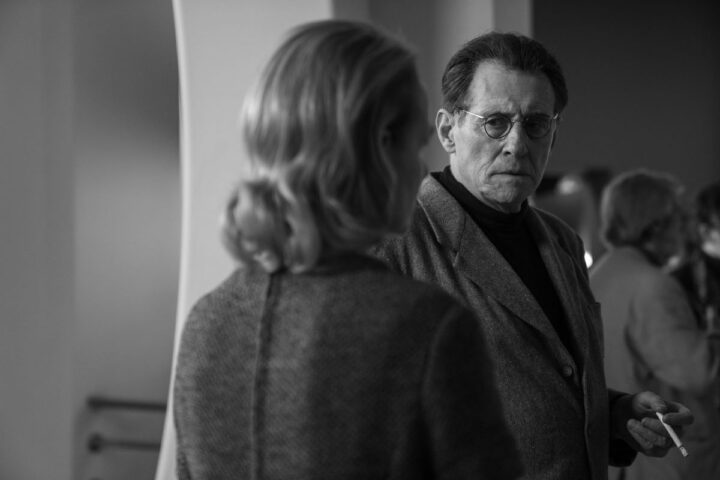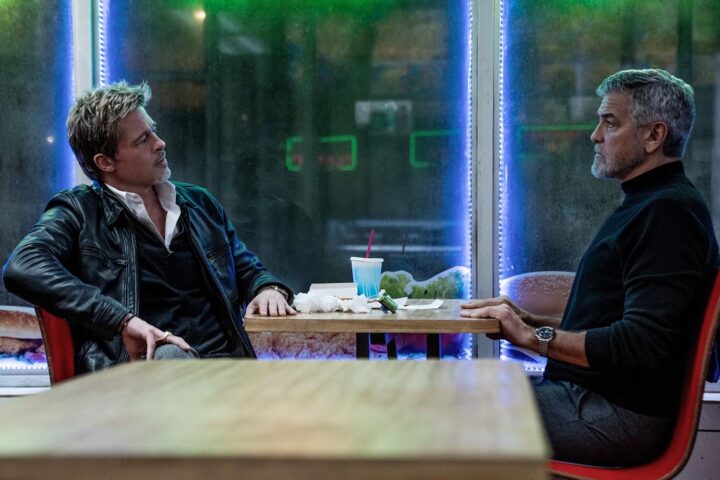What will the existence of the elite class, whose conspicuous consumption is a status symbol and has a negative impact on the environment, look like once everything has been completely destroyed? Joshua Oppenheimer’s The End imagines what that future could look like, joining the ranks of other recent films that have put outrageous privilege in their often sanctimonious cross hairs. But the willful blindness of the ruling class is something that Oppenheimer has intimately grappled with in his documentary work, namely The Act of Killing and The Look of Silence, and he attempts to carve out a unique approach to eating the rich on screen by dressing up his venom in the fanciful garbs of a Golden Age musical.
Set 20 years after an environmental collapse has wiped out society, The End takes place in a lavish underground bunker within the depths of a salt mine. This is the home for what may be the last human family on the planet: a former energy tycoon (Michael Shannon), his one-time Bolshoi Ballet dancer wife (Tilda Swinton), and their wide-eyed son (George MacKay), who, having lived his whole life inside the bunker, has never seen the outside world.
Alongside their butler (Tim McInnerny), doctor (Lennie James), and a close family friend (Bronagh Gallagher), this household continues to sustain an affluent lifestyle, surrounded by the expensive pieces of art and other prized possessions that they accrued before the end of the world. Beyond the regular safety drills conducted in case the bunker becomes exposed to dangerous pollution, they aim to keep their rarefied realm as distraction-free as possible.
The End’s opulent bunker and adjacent cave structure is realized through stunningly lavish production design that brings to mind everything from classic Hollywood musicals to the intricacies of Wes Anderson’s films. Combined with the frequent lapses into song, Oppenheimer’s cinematic reverie is nothing if not fitting, mirroring the delusions that his characters must necessarily embody to preserve their sense of control over their own lives.
Akin to his work in The Act of Silence, Oppenheimer again probes the idea that history is written by the victors, with the father whiling away his days working on a memoir that touts his benevolence. Enlisting his son’s help, the father crows out loud about his “orphanages in Africa” while determining that the climate crisis came about through a variety of natural factors, and not from the fracking that his energy business relied so heavily on. Understandably, then, the son is skewed at a deep level. When discussing the diorama of historical events that he’s been working on, he expresses his sincere belief that the Chinese laborers who worked on the U.S. railroads were glad to be exploited. “It moves me in a very personal way,” he amusingly gushes.
Then comes a stranger at their doorstep, a young woman (Moses Ingram) who survived on the outside but lost her own family in the process. As a result, the family’s existence within the bunker gets an expected shake-up. Upon taking her in, she immediately bonds with the son, gradually breaking down the myths that were passed down to him by his parents. At the same time, her own grief over the loss of her family and anger over why she was the one to survive predictably causes her hosts to reel from a cocktail of remorse, confusion, and self-reflection.
The End is certainly timely, and it trades in aptly coded allegories, such as its positioning of the two non-white characters as the most honest and clued into reality. But that also means that the film is too easily interpretable, and for long stretches it doesn’t shake the impression that it’s a derivative fable about an underprivileged outsider showing the cold rich people how to feel again or, as the T.S. Eliot quote that opens the film suggests, prompt some humility.
Perhaps Oppenheimer and Rasmus Heisterberg’s script is deliberately harking back to a storytelling mode that was characteristic of Hollywood cinema for dramatic effect, but the musical aspect, while a neat gimmick, isn’t memorable or cohesive enough to make the homage, well, sing. Ultimately, Oppenheimer’s analysis of the genocidal attitudes of the ruling class isn’t quite as ruthless in the realm of fiction as it was in his two Oscar-nominated documentaries.
The End becomes somewhat tedious over the course of its two and a half hours, but in spite of—indeed, perhaps because of—it feeling like its moving toward a familiar climax, its bleakly funny and existentially haunting conclusion packs a wallop. As the residents of the bunker stare out into the abyss, the final moments bring into focus a dismal reality: that the damage has already been done and no further understanding or good intentions on anyone’s part can fix it. Per the film’s title, it may be too late for us all, regardless of whether or not the apocalypse has arrived.
Since 2001, we've brought you uncompromising, candid takes on the world of film, music, television, video games, theater, and more. Independently owned and operated publications like Slant have been hit hard in recent years, but we’re committed to keeping our content free and accessible—meaning no paywalls or fees.
If you like what we do, please consider subscribing to our Patreon or making a donation.






